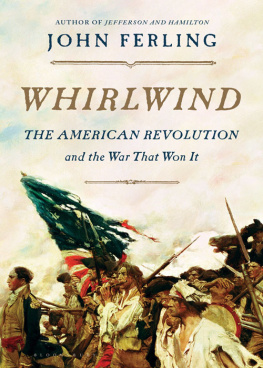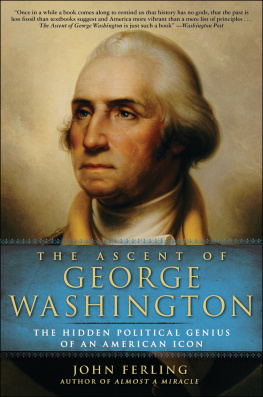SETTING THE WORLD ABLAZE
ALSO BY JOHN FERLING
John Adams: A Life
Struggle for a Continent: The Wars of Early America
The First of Men: A Life of George Washington
The World Turned Upside Down
A Wilderness of Miseries
The Loyalist Mind: Joseph Galloway and the American Revolution
SETTING THE WORLD ABLAZE

Washington,
Adams,
Jefferson,
and the American Revolution
John Ferling
2000
OxfordNew York
AthensAucklandBangkokBogotBuenosAiresCalcutta
Cape TownChennaiDar es SalaamDelhiFlorenceHong KongIstanbul
KarachiKuala LumpurMadridMelbourneMexico CityMumbai
NairobiParisSo PauloSingaporeTaipeiTokyoTorontoWarsaw
and associated companies in
BerlinIbadan
Copyright 2000 by John Ferling
Published by Oxford University Press, Inc.
198 Madison Avenue, New York, NY 10016
Oxford is a registered trademark of Oxford University Press
All rights reserved. No part of this publication may be reproduced, stored in a retrieval system, or transmitted, in any form or by any means, electronic, mechanical, photocopying, recording, or otherwise, without the prior permission of Oxford University Press.
Library of Congress Cataloging-in-Publication Data
Ferling, John E.
Setting the world ablaze: Washington, Adams, Jefferson, and the American Revolution / John Ferling
p.cm.Includes bibliographical references and index
ISBN 0-19-513409-5
1. StatesmenUnited StatesBiography.
2.Washington, George, 17321826.
3. Adams, John, 17351826.
4. Jefferson, Thomas, 17431826.
5. United StatesHistoryRevolution, 17751783Biography.
6. United StatesPolitics and government17751783
I. Title.
E302.5.F462000
973.3dc2199-089686
To
the predawn fitness warriors, with whom I begin my days,
and
Carol and the cats, with whom I close my days
Contents
PART ONE
Distinguished from the Common Run of Men
Children Who were Fathers of the Men
The Strong Desire of Distinction
The Vagaries of Youth
Getting under Sail
The Decisions of Youth
This Desultory Life
Toward Mid-Life
PART TWO
Fortitude, Vigour, and Perseverance
Waging War and Independence
An Epocha in History
Revolutionaries
To Ride in This Whirlwind
Independence
6Turning the Tide of Arms
War and Reform
PART THREE
It Is Impossible to Exceed This
From Despair to Triumph
A Fatal Crisis
The Great Peril, 1778-1780
The Womb of Fate
Victory
Who Shall Write the History of the American Revolution?
Memory and Meaning
The swift appearance of the first histories of the American Revolution eased the worries of those activists who had wondered whether the struggle would be remembered. Yet those same histories aroused fresh concerns. Some believed that the initial historians had told a story that was unrecognizable. Some leaders had been slighted, or disappeared altogether, while the role played by others had been improbably magnified. By the early nineteenth century some old revolutionaries, including John Adams and Thomas Jefferson, had come to doubt that the history of the great events of their time, as well as the portrayal of the leading figures in the American Revolution, could ever be fully and accurately told. Adams once said that the record had been so muddied by self-seeking, embroidered, and outrightly fallacious accounts that it would be impossible to write an accurate history of the American Revolution. Jefferson was no less dismayed. A factual account of the events between 1763 and 1783 was possible, he declared, but what had occurred in private within the corridors of power, which he characterized as the life and soul of history, was lost forever because of the paucity of accurate documentation.
If Adams and Jefferson could read much that has been written in recent years about early American history, they would be more bewildered than exasperated. Committed to social history, and shaped by political correctness and multiculturalism, professional historians during the past quarter century by and large have neglected the role played by leaders in important events. Indeed, they often have ignored seminal events. Today the only creature less fashionable in academe than the stereotypical dead white male, historian David Hackett Fischer has written, is a dead white male on horseback.
Where once the likes of Benjamin Franklin and James Madison, or epic events such as the French and Indian War or the Constitutional Convention,
Why, then, a book about three dead white men? Why not go with the flow? Obstinacy aside, the genesis of this book, in one sense, occurred many years ago when I was an undergraduate, adrift and trying to find both myself and the academic major that I had to declare at the end of my sophomore year. I had ruled out a history major after three semesters of mind-numbing required courses that primarily involved factual memorization. The last history course in the core curriculum, a Western Civilization Since 1600 course, had begun in the same vein when the professor fell ill. Not surprisingly, he was replaced by a junior, untenured member of the history department. Dr. William Painter tore up the course syllabi during his first day in class and sent us to the bookstore to purchase several paperbacks. Two had an incandescent impact on me: Alan Bullocks biography of Adolf Hitler and Marcus Cunliffes analytical study of George Washington. After eighteen months of pre-exam stints to commit to memory the Democratic Party platform of 1828 or the terms of the Hawley-Smoot Tariff, here was history that was fascinating. I found myself puzzling over what drove these men, why they were capable of leading others, what choices they had faced, and how they met the test of war and leadership. I soon decided not only that I wanted to take more history courses, but that someday I hoped to write like Professors Bullock and Cunliffe.
In another sense, the genesis of this book was an invitation to speak at an Honors Day Convocation at the university where I teach. Having written biographies of Washington and John Adams, I was researching a biography of Jefferson, which seemed the logical next step, when I was approached about addressing the convocation. I was asked to contrast the formative years of Adams and Jefferson, probably in the hope that the experiences of these successful young men might provide useful lessons to our students. I accepted the invitation and began to formulate my address. The results were amazing; a comparison of Adams and Jefferson, I soon discovered, prompted questions that I had not previously asked, sent me on pathways of inquiry that I might never have traveled, and led to conclusions that otherwise I probably would not have been reached. I abandoned the Jefferson biography for a comparative study of Washington, Adams, and Jefferson in the American Revolution.
One other matter was crucial. Although the recent scholarship has resulted in extraordinarily enriching breakthroughs in our understanding of people too long neglected, informing us with regard to how they lived and related to the larger social structure and material processes, sight has been all but lost of the relationship between leaders and outcomes, between action and events. Military leaders in the War of Independence made strategic and tactical decisions that impacted countless lives, determined the shape of the war and to some extent its length, and certainly were important to the outcome of the conflict. Their orders sometimes had repercussions on the contours of American history for generations to come. The texture of the war, the nature of the armed forces, and the shape of the new nation emerged from decisions made in legislative halls and, as Jefferson said, in covert discussions in backroom chambers. Political leaders communicated ideas to the citizenry. At times they created new ways of thinking about old problems and shepherded the citizenry, or some of it, along unchartered paths. They gave voice and meaning to previously ill-defined or unarticulated aspirations, and on occasion painted a visionary panacea for humankind to behold. Choices were made by diplomats in paneled drawing rooms across the sea that touched untold lives in North America. Among other things, their judgments sometimes caused men to soldier or go home, decided the fate of the unfree, and determined whether frontiers were to be opened or remain closed.





